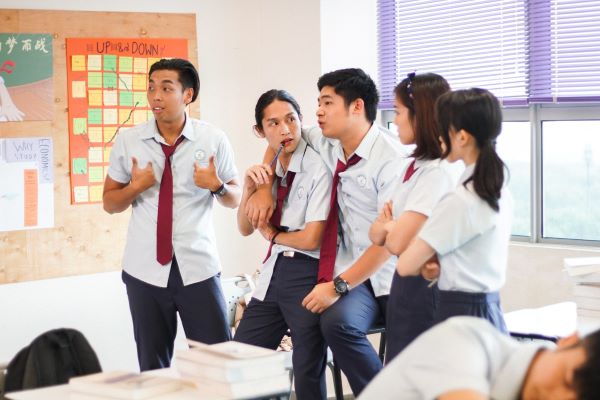Watching Layla Zhuqing Ji’s excoriating bullying drama Victims(s), one can understand why the Chinese filmmaker chose to make the film the Malaysia. Based on true events, it takes aim at several institutions within Chinese society; parental, legal, and educational, in the course of picking apart a murder committed by one schoolboy against another. It is a queasily fascinating work, filmed with a furious urgency that leaves little room for melodrama, or even much in the way of sympathy for its characters. While it abandons its pretence as a ‘why-dunnit’ early on, it slowly builds a mountain of circumstances so vertiginous it makes its implosion into bloodshed inevitable.
Victim(s) opens with the murder of Gangzi (Kahoe Hon), stabbed to death as he draws money from an ATM. The perpetrator is Chen (Xianjun Fu), a quiet young man who soon hands himself in. The press have a field day. Gangzi was a poor kid. Chen is the son of Mei (Huang Lu), the CEO of a company infamous for making violent video games. Chen is locked up and Gangzi is mourned. The story then cuts back to the events leading up to the murder. We discover that Gangzi was no innocent victim, but a bully wearing his masculine aggression as armour lest his homosexual feelings become public. This extends to his resentment of Chen’s friendship with enigmatic new student Qianmo (Wilson Hsu). Gangzi already targets Chen repeatedly, but Qianmo becomes an unwitting catalyst of further violence, and a victim herself.
Ji’s script focuses on the toxicity of the pupils’ environments as much as the bullying itself. The school is presented as a social Darwinist swamp that actively fosters resentment. The ‘elites’ sit at the front, and are afforded extra privileges. The rest are left to fend for themselves, teachers are largely absent, and a blind eye is turned to the violence. The home lives of Ganzi and Chen are also less than ideal in different ways. The bullying itself is unflinching; almost ludicrously so at times. The frequent beating sustained by Chen by Gangzi and his friends are particularly vicious with no threat of censure from anyone in authority. Throw in relentless school gossip and the proliferation of social media and the almost ritual humiliation captured on camera and distributed, and Victim(s) resembles a more grounded examination of the themes in Assassination Nation.
It could be argued that the extremity of it all tests the bounds of plausibility – just how bad does it have to get before any action would be taken? – but thankfully the performances from the central trio are thoroughly convincing. Hon manages to strain the last drops of humanity from his loathsome character, and Hsu is eerily stoic as Qianmo, who seems better equipped to deal with the expected hazing of the new girl. Fu has the most difficult role; one that could easily be reduced to victimhood. He is required to reach the point where Chen so brutalised that he fails to fight back the one time that he absolutely must. The young actor convinces that his eventual actions are not just understandable, but almost the only course he could have taken.
Although the section set in the past is the real meat of the story, it is dextrously woven into the present skilfully and unobtrusively by editor Hsiao-Yun Ku. It is there that the second central theme of parental responsibility comes to bear as the Mei and Gangzi’s mother Gu (Remon Lim) must negotiate what part they may have played, and how they may have tried and failed to protect their children. If there is any hint of hope and reconciliation at all in this rather bleak tale, it comes from those left behind.
Victim(s) is a film with so much going on in terms the scope of its targets, that one almost wishes for more time to allow some of the more tangential threads to play out. For example, there is something of a framing device in which several students are interviewed about the acrimony between Gangzi and Chen. It’s interesting to see how some of the more peripheral players work to try and cover their tracks and implicate others and a deeper exploration of those consequences would have been welcome. Still, it is at times a harrowing watch with the abundant cruelties of mob mentality portrayed in all their rancid, but all too human, carnality. While it dips its toe in the waters of polemics at times, the talented Ji keeps things from becoming overly nihilistic, and has made an engrossing and clear-headed drama that encompasses all the extra layers that recent modernity has added to the age-old issue of bullying.
Screening as part of Glasgow Film Festival 2021
